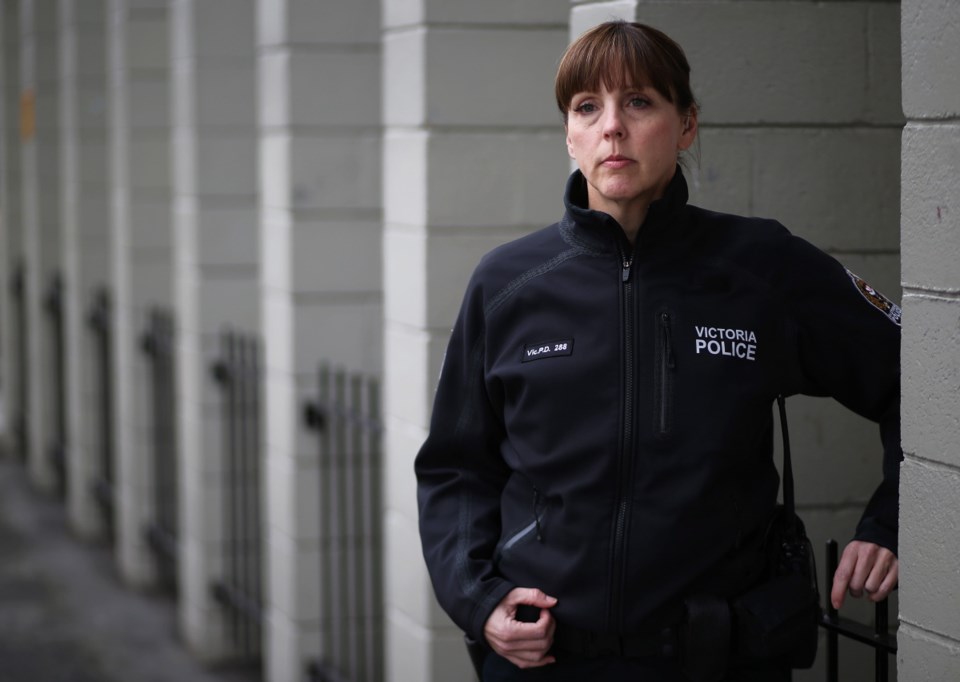Police across Greater Victoria often face situations that force them to switch roles from cops to front-line mental-health workers.
On Monday afternoon, for example, Saanich police and the Emergency Response Team spent four hours trying to persuade a distraught man, who said he had a gun, to surrender peacefully.
On Monday night, a Victoria police officer was injured after a struggle with a suicidal man in the underground parking garage of the Victoria provincial courthouse.
Eight days earlier, a serious head-on crash on the Patricia Bay Highway brought a dramatic conclusion to an hours-long search for a 29-year-old Saanich man in severe mental distress, who had been driving erratically across the region.
Saanich police spokesman Sgt. Steve Eassie said individuals who are arrested under the Mental Health Act may receive a followup visit from staff with the Integrated Mobile Crisis Response Team, which includes one police officer.
“We have become far better at dealing with and recognizing someone who is struggling with mental illness, and that has come through training,” Eassie said, adding that police communicate closely with mental-health professionals to get people the help they need.
Communication around mental illness, a topic that is often stigmatized, was at the centre of Bell Canada’s Let’s Talk social media campaign on Tuesday.
The conversation took place on Twitter and for every tweet using the #BellLetsTalk hashtag, Bell Canada promised to donate five cents to mental-health initiatives.
Eassie estimates almost 20 per cent of the department’s calls have a mental-health component. The Victoria Police Department, which deals with the bulk of the street issues in the downtown, says mental illness is a factor in at least one-third of calls.
Victoria Police Chief Frank Elsner told the Times Colonist that one of his goals is to work with health-care providers and politicians to improve services for the mentally ill.
“I think mental health has been downloaded so far that, the vast majority of the time, the police are the first point of contact for people with mental-health issues,” Elsner said this month. “That does not provide a good level of care for those individuals. They’re not criminals. They have a mental-health problem.”
Rev. Al Tysick, former executive director of Our Place drop-in centre, now runs the Dandelion Society, which helps the region’s hardest to house and those who have been banned from the shelters because of violence. Tysick knows all too well the frustration of trying to find a suitable and safe place for a deeply addicted homeless person in medical distress.
“We have nowhere to take them,” Tysick said. “The police don’t want to put them in cells for fear of them hurting themselves. The hospital doesn’t want them because they’re disturbing and they’re an issue, and the shelters can only [have] so much tolerance. All those issues are of major concern to me in our city.”
Island Health runs several integrated mental-health ACT — or Assertive Community Treatment — teams to manage people with mental illlness living in the community.
Each team consists of nurses, psychiatrists, outreach workers, social workers and police officers, who follow up with people — sometimes daily — to make sure they are taking their medication or to accompany them to appointments or grocery shopping. People can be referred to the program by family, friends, corrections officers, addictions counsellors or the police.
Const. Debbie Justice, who works with the Victoria Integrated Community Outreach Team, encourages the dialogue spurred on by the Let’s Talk campaign.
“It’s good to talk about it instead of stigmatizing or turning a blind eye to it and thinking, ‘It’s not my problem.’ It is — it’s society’s problem,” Justice said.
“I think it’s all about education and people knowing what resources are out there. [Let’s] get the ball rolling and try to get these people the help that they need instead of ignoring the problem.”
Need help?
• Vancouver Island Crisis Chat provides online emotional support, crisis intervention and suicide prevention services through the Vancouver Island Crisis Society website, vicrisis.ca.
• Anyone who requires support immediately should call the Vancouver Island Crisis Line at 1-888-494-3888, which is available 24 hours a day, seven days a week.
• Those who want assistance from the Island Health ACT teams can drop into the office at 941 Pandora Ave., Monday to Friday between 8 a.m. to 4 p.m.
• If you are dealing with an emergency, call 911.



